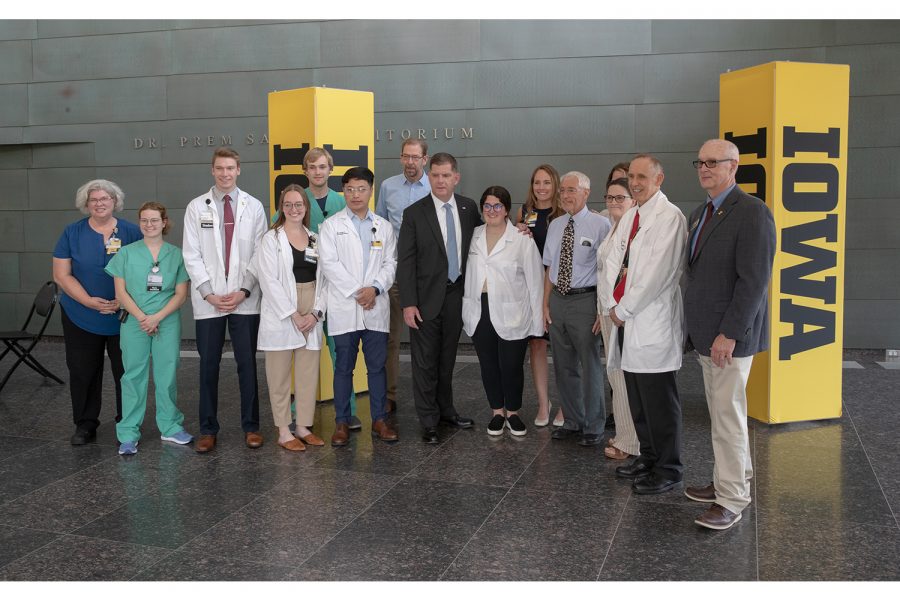U.S Secretary of Labor visits, thanks University of Iowa for COVID-19 research, contributions
U.S Secretary of Labor Martin J. Walsh visited the university to thank the institution and workers for their contributions in combating the COVID-19 pandemic.
Secretary of Labor Marty Walsh visited the Medical and Education Facility (MERF) on June 17 2021. He thanked frontline health care workers for helping in the battle against the COVID-19 Pandemic. (Daniel McGregor-Huyer)
June 17, 2021
U.S Secretary of Labor Martin J. Walsh expressed gratitude to the University of Iowa and its workers for the work done in combating the COVID-19 pandemic during his visit to campus on Thursday.
Walsh met with students, frontline health care workers, and university administration at the Medical Education and Research Facility following a tour of a state-of-the art laboratory that accommodates research on select agents and toxins.
The UI has been recognized nationally for its role in being on the forefront of COVID-19 research, treatment, care, and vaccination. Ninety-one percent of UI health care employees have been vaccinated, and 6,738 students got vaccinated by Student Health, according to a press release statement from the UI.
Walsh said it was because of the health care workers at the UI and across the country that President Joe Biden’s plan to get out 100 million vaccinations in people’s arms was revamped to 200 where the goal was met with a week to spare
The UI enrolled in 410 vaccine trials and 100 statewide vaccination clinics that were staffed by pharmacy students, the press release said.
Walsh also expressed gratitude toward the work that UI students, health care workers, and scientists put in non-stop, from distributing PPE equipment to navigating social distancing guidelines and testing.
UI Hospitals and Clinics has 1,400 nurses cross-trained for COVID-19, and it has treated 1,800 COVID-19 in-patients, the press release said. Additionally, the hospital system conducted over 1.5 million telehealth COVID-19 screenings.
“None of you stayed home,” Walsh said. “Even students in the medical schools were helping carry the burden, and I want to thank you for that because you helped get the country through a very difficult time.”
UI interim president John Keller said the work done from the research and vaccinations is why the university is able to return to a traditional format.
The UI is participating in the Biden Administration’s COVID-19 College Challenge by offering a one-time $10 Iowa City Downtown District card for those with a valid vaccine card, which will continue in the fall. So far, 3,848 gift cards have been distributed, Keller said.
While Keller is optimistic about the return of the “Big Ten college experience” such as sports and live performances, he said the university is still on its way to making a full recovery.
“We are not recovered, but we are recovering,” Keller said.
Professor of Microbiology and Immunology Stanley Perlman, who is also the Mark Stinski Chair in Virology, said both the support from the UI and federal government is why the work toward recovery from COVID-19 has been successful.
Pearlman is a member of the Vaccines and Related Biological Products Advisory Committee which advises the Food and Drug Administration on the authorization of vaccines. Until recently, Perlman was one of only 10 full-time coronavirus virologists in the world, according to UI Assistant Vice President for External Relations Jeneane Beck.
“It’s that initial step, the initial support following the hard work, and it’s so important in the research,” Perlman said.
While the country has made progress with the pandemic, Walsh said there is still more work to be done. The Biden administration is looking forward to laying out policies, such as the American Families and Jobs plans, and focusing on protecting underserved communities.
In an interview with The Daily Iowan after the event, Walsh said one of the most important steps in continuing recovery against the pandemic is for people to get vaccinated.
“We have seen in areas where mass vaccinations have occurred that it works to stop the spread,” Walsh said. “So it’s important [for people] to do their part and protect their community.”



